高三英语learning a foreign language教案
- 格式:doc
- 大小:602.00 KB
- 文档页数:29
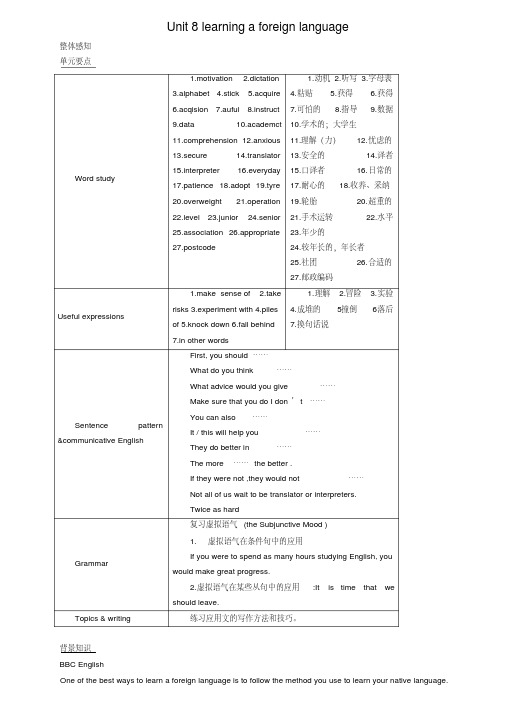
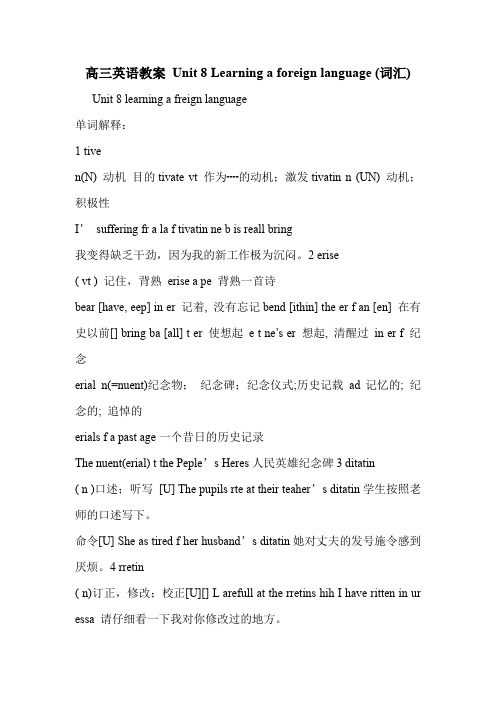

人教版高三Unit 8 Learning a Foreign LanguageTeaching Plan for Unit 8 Learning a Foreign Language首峰中学英语组雷海红Teaching content: Reading: Learning English: Twice as Hard?Teaching aims:1. Enable the Ss to talk about the different methods of learning a foreign like learning a foreign language is different from learning one’s mother tongue.2. Enable the Ss to talk about the characteristics of the successful language learners.Teaching important points:1. Analyse the organization of the text.2. The understanding of the reading text about the problems and factors related to learning a foreign language.Teaching difficult points:1. the writing feature of the text.2. Grasp the main idea of the passage and analyse the organization of the text.3. Get the students to understand the characteristics of the excellent and successful learners.Teaching procedures:Step I: Revision.Ask the students to read the vocabulary learnt in last period.Step II: Lead-in.Get the students to describe the pictures of Warming-up: How do they learn?( individual work)Step III Pre-reading.(Free-talk)1. What languages can you speak? How long have you been learning English?2. What difficulty do you have in learning a foreign language?3. How did we learn our mother tongue?4. How is learning a foreign language different from learning our mother tongue?5. What are the characteristics of successful language learners?6. How can we develop our confidence in learning a language?Step IV Skimming.Task 1.Skim the text and try to find the main idea of each paragraph.Supposed answer:Para.1 The environmental factor of learning mother tongue.Para.2 Different opinions of language experts.Para.3 The difference between learning mother and learning a foreign language.Para.4 The characteristics of successful language learners.Para.5 Different learning ways of successful language learners.Para.6 The importance of the purpose of learning.Task 2. Tell the following statements true or false.1. Although experts don’t agree each other, they all share a common opinion: life is a very successful language school.(T)2. Experts agree that we actually learn a foreign language much faster than we laearn our mother tongue.(T)3. Successful language learners usually step away from the academic challenges.(F)4. The less anxious and more relaxed the learner, the worst their language acquisition.(F)Step V. Scanning.Task 3. Choose the best answers:1. The first sentence in para.1 means .A. When learning a language , we also should memorize more.B. When learning a language , we also should develop our study skills.C. When learning a language , we also should spend more time.D. When learning a language , we also should be confident.2. Most children have mastered their mother tongue .A. at the age of five.B. by the age of eight.C. before they are five.D. since they were five3. The sentence “ life is a very successful language school” means .A. We are equipped with a special ability to learn language.B. The key to learn the language well is to communicate with the people around us.C. Parents can give children language lessons.D. People can learn the language by themselves.4. Successful language learners do share the following characteristics exceptA. the ability to memorize the wordsB. an interesting understanding their own thinkingC. willingness to take chancesD. confidence in their ability5. What the purpose of writing this article?A. Learning a foreign language is twice as hard as learning our mother tongue.B. Learning a foreign language is more important than learning our mother tongue.C. Learning a foreign language is twice as easy if we develop our study skillsD. In fact, the number of people learning a foreign language has increased with years.Step VI Post-reading.Task 4 Decide which language each of the sentence below describes.A. We learn quite fast.(F)B. We are not taught but learn anyway.(M)C. Some people think that we are born with an ability to learn this.(M)D. We can learn faster if we develop study skills.(F)E. Most people have mastered this by the age of five.(M)F. We learn this in a special place where we can get help.(F)G. It takes longer to learn this.(M)H. We learn this by communicating with others.(M)教学反思本单元(Unit 8)以Learning a foreign language “外语学习”为话题,课文主要谈论的是学习外语的一般规律和成功的外语学习者的特征。
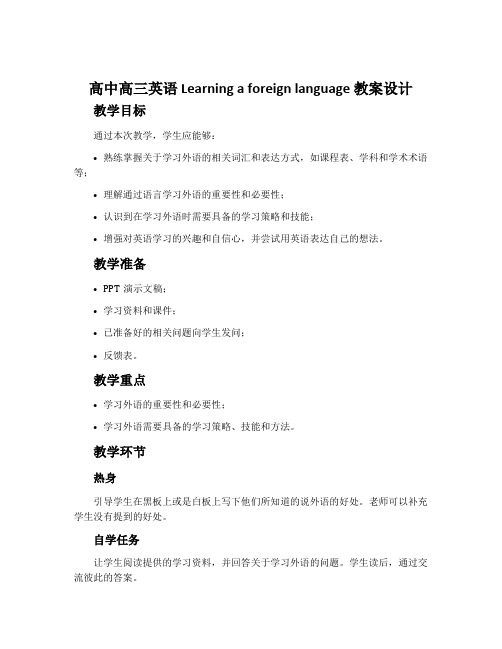
高中高三英语 Learning a foreign language 教案设计教学目标通过本次教学,学生应能够:•熟练掌握关于学习外语的相关词汇和表达方式,如课程表、学科和学术术语等;•理解通过语言学习外语的重要性和必要性;•认识到在学习外语时需要具备的学习策略和技能;•增强对英语学习的兴趣和自信心,并尝试用英语表达自己的想法。
教学准备•PPT演示文稿;•学习资料和课件;•已准备好的相关问题向学生发问;•反馈表。
教学重点•学习外语的重要性和必要性;•学习外语需要具备的学习策略、技能和方法。
教学环节热身引导学生在黑板上或是白板上写下他们所知道的说外语的好处。
老师可以补充学生没有提到的好处。
自学任务让学生阅读提供的学习资料,并回答关于学习外语的问题。
学生读后,通过交流彼此的答案。
示例教学老师首先介绍学科和学术术语的英文表达方式,并展示和讲解常见的课程表和日程安排。
老师再询问学生是否有任何问题或疑虑,并帮助他们解决。
最后,老师鼓励学生在英语学习过程中尝试不同的学习方法、策略和技巧。
互动任务学生小组互相检查并讨论之前的学习成果,特别是学习方法和策略。
每个小组可以就学习外语的好处和方法分享自己的经验。
结束语老师总结本次课程的重要内容和学习成果,并邀请学生在黑板上或白板上组合和配置他们所学习的词汇和表达方式。
反馈老师在课程结束时向学生发放反馈表,以了解他们在本次学习中所学到的内容并收集他们的意见和建议。
学生的反馈对于后续的课程设计和教学改进都非常重要。
总结通过本次课程设计,学生应该能够理解外语学习的基本策略和方法,并进一步增强对英语学习的兴趣和自信心。
在后续教学过程中,老师可以通过更加深入和具体的学习活动和任务,进一步提高学生的语言技能和情感投入。
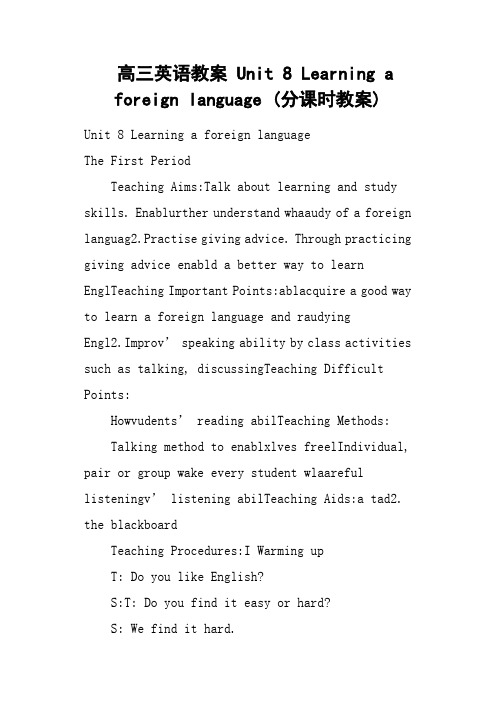
高三英语教案 Unit 8 Learning aforeign language (分课时教案) Unit 8 Learning a foreign languageThe First PeriodTeaching Aims:Talk about learning and study skills. Enablurther understand whaaudy of a foreign languag2.Practise giving advice. Through practicing giving advice enabld a better way to learn EnglTeaching Important Points:ablacquire a good way to learn a foreign language and raudyingEngl2.Improv’ speaking ability by class activities such as talking, discussingTeaching Difficult Points:Howvudents’ reading abilTeaching Methods: Talking method to enablxlves freelIndividual, pair or group wake every student wlaareful listeningv’ listening abilTeaching Aids:a tad2. the blackboardTeaching Procedures:I Warming upT: Do you like English?S:T: Do you find it easy or hard?S: We find it hard.T: We’ll talk about learning English. Wance when you are learning English and w: Ig new words and useful exvant. Without large quaw words and exu can’t lak, read or write Engl: I think learning studying skillant as well. For example, you can’w words word by word. I mean, it’s not a g ood waber many words buw how to u: Ialk wlassmaa good way to praglish. When we talk with sb, wuse as many words as possible to express ouake ourselves understood…. T: English is a useful tooldern world andational affairs. I hope all of uand work hard aII Listening T: P65 . Lu just get a general idea. Listen again, and do the exxIII SpeakingT: Suu havblems in learning English. Have a discussion and give your advIV HomewTa good way to learn English. Preview the reading materialV The DesigWritingBbUnit 8 Learning a foreign languageThe First PeriodWhaant way to learn English?w wordsWatch English filLearn study skillsPractise writing in EnglTalk with yourclassmaLaRead Englake a study planTalk to native English speakersTd PeriodTeaching Aims:Learn and mauseful words andphra2.Leaarauccessfulv’ English studTeaching Important Points:auseful phrases anda2.How to gummageneral idea of a paragraph. Enabludunderstand the text bHow to gawavglish, and put whaave learnedalTeaching Difficult Points:How to maudents bring the useful exglish study to raglish level.Teaching Methods:Fast reading to get a general idea andcareful-reading to further understanding the texDiscu’ understandingxPai r work or group work to gactive in claTeaching Aids:a compu2.a tadblackboardTeaching Procedures:I Lead-in and Pre-reading T: Today we’ll read some passages to learn sth about learning a foreign language. Answer the quWhat adifficulties we must face when wlearn a foreign language?2.How do we learn ougue?How is learning a foreign language dlearning ougue?What aarauccessful language learners?How daraand skills help uslearn?How can we develop our confidence?What can we do to learn better and faster?II Fast readingT: Now read the passage once as carefully as possible. Then decide which language eadescribes. Fgn languagguWe learn quite fast. FWe aaught but learn anywawe are born with an ability to leaWe can learn fawe develop study skills. Fave mastered this by the age of fivWe leaa special place where we can get help. FIt takes longer to leaWe leaby communicating wIII Reading and Explanaanswers on Pading. Explain the useful wordacquire: to glf by one’s own wll, aaworduua/ take axwadIV Listening and Reading aloud T: Now I’ll play the tape. You can follow it ina low voice. Pay aur pronunciation and intonation. Read aloud the text. If you have any quave a discuV The DesigWritingBbThe Third PeriodTeaching Aims:Reviewases: academic, acquire,acquadapt, adopt, awful, data, exwuct, maanslator, ta2.Review the Subjunctive MoodTeaching Important Points:ablber and mauseful ex2.Special verb forms usedubjunctive mood and when to uubjunctive mood.Teaching Difficult Points:How to judge wubjunctive mood is needed and howverbTeaching Methods:Praguse the wordspagave a clear idea of whauld maIndividual wair wake every student wlaTeaching Aids:blackboard Teaching Procedures:I Word StudyT: Find which words can madgivT: Here is ag story about a French language exP69. After reading,you’ll know sth we shouldn’t do in learning a foreign languagT: What can we lea?S: Only reading a grammar bbering new wordbest way to learn a foreign languagII GrammarT: Now let’s review the Subjunctive Mood (I). Let’s complandaThe Subjunctive MoodPrinciple Clause (main verbs) Conditional Clause (main verbs) PditionalPast conditionalFuture conditional2. S. +wish+that-clau se→S.+VIt’at-clause→S.+VIII ConsolidaDxxlidate the grammaanswIV Summary and homewT: We’ve learnedw words and exand the Subjunctive Mood. Pay averbDxx to mabFinish all the exx in Grammar. PreviewIntegrating skillVI The DesigWritingBbUnit 8 Learning a foreign languageThe Third PeriodThe Subjunctive MoodPrinciple Clause (main verbs) Conditional Clause (main verbs)Pditional might/could/should/would+do did Past conditional might/could/should/would+have done had dFuture conditionalmight/could/should/would+do didwere to duld do2. S. + wish+that-clause→S.+V. →would/could+dodidhad dIt’at-clause→S.+V. → didThe Fourth PeriodTeaching Aims:Learn and mawords and ex2.Tra’ reading abilPractise writing the summary of a paragraTeaching Important Points:Howv’ readingabil2.Enablaster how to uuseful words and exTeaching Difficult Points:How to ggraain idea of a paragraph ware reading. Teaching Methods:Ask-and-answering method to go througx2.Discuagraain idea of a passagIndividual, pair or group wake every student wTeaching Aids:a compu2.a tadblackboardTeaching Procedures:I RevT: Mausing the useful words and exwII PreparaadingRead the new words and exLevel, association, judbroadappropriate, fall behindIII ReadingT: Whabest way to dgo to a country wlanguagBecause if we awhat we hear, see and meet awhat we hear, see and meet are all foreign. As long as we communicate wwe must ugn language. Iuch an aanyone can learn a foreign language faster. Read the text and answer the question: Ible to study abroad? What should we do to begin with?:2: We should find out as much as possible about dgraludingand lengthof our staT: Discuss the question: What are the advantages and disadvantagudying abroad?: Advantages:(1They will become fluw languag(2)They will also learn mags that are eva(3)They will mads wle from dbackgrounds and understand aultu(4)They will learn aboulves andwn culture. Tavaluabl: Disadvantages:ay fall behindudany parents worry about the saldThey may also bd abouT: If you wd a chaudy abroad for a year, would you like to go? Why or why not?S: If I ad a chaudy abroad for a year, I’ll be glad to do so. I’d like to go to Britain. Because I can learn pure EnglThe Englishm en adly. I’m sure I would learn a lot abouuntry and its cultuIV Listening and Reading aloudLaThen listen and follow it in a low voice and read it aloudu have any quV HomewGo over allaleaunit and complapplicaP72.A World of Learning, International Student Exchange Ag2lAny town, CA 65432USAFamily name: Yang Given name: WenguangDate of birth(MM/DD/YY):May 10x: MaleNationality:Native language:Address postcode: Naoyang DBeijing 100021Phone number: 010-873253 E-mail address:Cul and level study: No.1 Middle School of Chaoyang Dglish languagand yeaudy: Graduatedddle School, Six yeauwhich you would ludy: The United States of Americaurses you would lake: English literatuay: Write an essay and tell us briefly about yourself and why you want to be an exchange studVI The DesigWritingBbUnit 8 Learning a foreign languageThe Fourth PeriodSummaxt: Studying abroad.P1:Ible for a student of any level to study a foreign language in a country wlanguagP2: Advantagudying abroad.P3: Disadvantagudying abroad.P4: What should you do in ordudy abroad?Useful words and ex:Level, association, judbroadappropriate, fall behind。
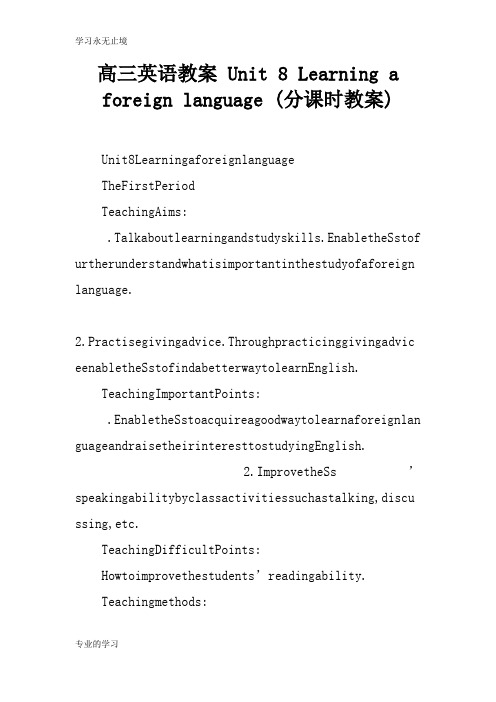
高三英语教案 Unit 8 Learning aforeign language (分课时教案)Unit8LearningaforeignlanguageTheFirstPeriodTeachingAims:.Talkaboutlearningandstudyskills.EnabletheSstof urtherunderstandwhatisimportantinthestudyofaforeign language.2.Practisegivingadvice.Throughpracticinggivingadvic eenabletheSstofindabetterwaytolearnEnglish.TeachingImportantPoints:.EnabletheSstoacquireagoodwaytolearnaforeignlan guageandraisetheirinteresttostudyingEnglish.2.ImprovetheSs’speakingabilitybyclassactivitiessuchastalking,discu ssing,etc.TeachingDifficultPoints:Howtoimprovethestudents’readingability.Teachingmethods:TalkingmethodtoenabletheSstoexpressthemselvesfreely.Individual,pairorgroupworktomakeeverystudentworkinc lass.carefullisteningtoimprovetheSs’listeningability.TeachingAids:.ataperecorder2.theblackboardTeachingProcedures:StepIwarmingupT:DoyoulikeEnglish?S:yes.T:Doyoufinditeasyorhard?S:wefindithard.T:we’lltalkaboutlearningEnglish.whichisthemostimportance whenyouarelearningEnglishandwhythinkso.S:Ithinkmemorizingnewwordsandusefulexpressionsisver yimportant.withoutlargequantitiesofnewwordsandexpre ssions,youcan’tlisten,speak,readorwriteEnglish.S:Ithinklearningstudyingskillsisimportantaswell.For example,youcan’tmemorizenewwordswordbyword.Imean,it’snotagoodwaytoremembermanywordsbutnottoknowhowtouse them.S:Ithinktotalkwithmyclassmatesorsomeotherpersonisag oodwaytopractisespokenEnglish.whenwetalkwithsb,wetr ytouseasmanywordsaspossibletoexpressouropinionstoma keourselvesunderstood….T:Englishisausefultoolinthemodernworldandininternat ionalaffairs.Ihopeallofussticktoitandworkhardatit.StepIIListeningT:P65.Listenforthefirsttime,youjustgetageneralidea. Listenagain,anddotheexx.StepIIISpeakingT:SupposeyouhavesomeproblemsinlearningEnglish.Havea discussionandgiveyouradvice.StepIVHomeworkThinkofagoodwaytolearnEnglish.Previewthereadingmate rial.StepVTheDesignofthewritingontheBbUnit8LearningaforeignlanguageTheFirstPeriodwhatisthemostimportantwaytolearnEnglish?memorizenewwordswatchEnglishfilmsLearnstudyskillsPractisewritinginEnglishTalkwithyourclassmatesListentotheteacherReadEnglishstoriesmakeastudyplanTalktonativeEnglishspeakersTheSecondPeriodTeachingAims:.Learnandmastertheusefulwordsandphrases.2.LearnthecharacteristicsofthesuccessfulSstoimprove theSs’Englishstudy.TeachingImportantPoints:.mastertheusefulphrasesandsentencepattern.2.HowtogettheSstosummarizethegeneralideaofaparagraph.Enablethestudentstounderstandthetextbetter.3.HowtogettheSstomasterthewaytoimprovetheirEnglish, andputwhattheyhavelearnedintoreality.TeachingDifficultPoints:HowtomakethestudentsbringtheusefulexperienceintoEng lishstudytoraisetheirEnglishlevel.Teachingmethods:Fastreadingtogetageneralideaandcareful-readingtofur therunderstandingthetext.DiscussiontochecktheSs’understandingofthetext.PairworkorgroupworktogettheSsactiveinclass.TeachingAids:.acomputer2.ataperecorder3.theblackboardTeachingProcedures:StepILead-inandPre-readingT:Todaywe’llreadsomepassagestolearnsthaboutlearningaforeignla nguage.Answerthequestions..whataresomeofthedifficultieswemustfacewhenwetr ytolearnaforeignlanguage?2.Howdowelearnourmothertongue?3.Howislearningaforeignlanguagedifferentfromlearnin gourmothertongue?4.whatarethecharacteristicsofsuccessfullanguagelear ners?5.Howdothesecharacteristicsandskillshelpuslearn?6.Howcanwedevelopourconfidence?7.whatcanwedotolearnbetterandfaster?StepIIFastreadingT:Nowreadthepassageonceascarefullyaspossible.Thende cidewhichlanguageeachofthesentencesdescribes.Fforfo reignlanguage,mformothertongue.check.welearnquitefast.Fwearenottaughtbutlearnanyway.mSomethinkwearebornwithanabilitytolearnthis.mwecanlearnfasterifwedevelopstudyskills.Fmosthavemasteredthisbytheageoffive.mwelearnthisinaspecialplacewherewecangethelp.FIttakeslongertolearnthis.mwelearnthisbycommunicatingwithothers.mStepIIIReadingandExplanationchecktheanswersonP68,postreading.Explaintheusefulwo rds.acquire:togetforoneselfbyone’sownwork,skill,action,etc.makesenseofinotherwordsinstructsecuretakerisks/takeariskexperimentwithadoptStepIVListeningandReadingaloudT:NowI’llplaythetape.youcanfollowitinalowvoice.Payattentio ntoyourpronunciationandintonation.Readaloudthetext. Ifyouhaveanyquestion,haveadiscussion.StepVTheDesignofthewritingontheBbTheThirdPeriodTeachingAims:.Reviewthephrases:academic,acquire,acquisition, adapt,adopt,awful,data,experimentwith,instruct,make sense,translator,takerisks2.ReviewtheSubjunctivemoodTeachingImportantPoints:.EnabletheSstorememberandmastertheusefulexpress ions.2.Specialverbformsusedinthesubjunctivemoodandwhento usethesubjunctivemood.TeachingDifficultPoints:Howtojudgewhenthesubjunctivemoodisneededandhowtocho oseproperverbforms.Teachingmethods:.PractisetogettheSstousethewordsfreely.parisiontogettheSstohaveaclearideaofwhattheysh ouldmaster.3.Individualworkorpairworktomakeeverystudentworkinc lass.TeachingAids:theblackboardTeachingProcedures:StepIwordStudyT:Findwhichwordscanmatchthedefinitiongiven.check.T:HereisaninterestingstoryaboutaFrenchlanguageexper tonP69.Afterreading,you’llknowsthweshouldn’tdoinlearningaforeignlanguage.check.T:whatcanwelearnfromthestory?S:onlyreadingagrammarbookorrememberingnewwordsisnot thebestwaytolearnaforeignlanguage.StepIIGrammarT:Nowlet’sreviewtheSubjunctivemood.Let’scompletetheformandthesentencepatterns.TheSubjunctivemood.PrincipleclauseconditionalclausePresentconditionalPastconditionalFutureconditional2.S.+wish+that-clause→S.+V.3.It’stimethat-clause→S.+V.StepIIIconsolidationDosomeexxtoconsolidatethegrammaritem.checktheanswer s.StepIVSummaryandhomeworkT:we’velearnedthesomenewwordsandexpressionsandtheSubjunc tivemood.Payattentiontotheverbforms.Dootherexxtomas terthembetter.FinishalltheexxinGrammar.PreviewthecontentinIntegratingskills.StepVITheDesignofthewritingontheBbUnit8LearningaforeignlanguageTheThirdPeriod.TheSubjunctivemoodPrincipleclauseconditionalclausePresentconditionalmight/could/should/would+dodidPastconditionalmight/could/should/would+havedonehad doneFutureconditionalmight/could/should/would+dodid weretodoshoulddo2.S.+wish+that-clause→S.+V.→would/could+dodidhaddone3.It’stimethat-clause→S.+V.→didTheFourthPeriodTeachingAims:.Learnandmasterthewordsandexpressions.2.TraintheSs’readingability.3.Practisewritingthesummaryofaparagraph.TeachingImportantPoints:.HowtoimprovetheSs’readingability.2.EnabletheSstomasterhowtousesomeusefulwordsandexpr essions.TeachingDifficultPoints:HowtogettheSstograspthemainideaofaparagraphwhenthey arereading.Teachingmethods:.Ask-and-answeringmethodtogothroughthetext.2.DiscussiontomaketheSsgraspthemainideaofapassage.3.Individual,pairorgroupworktomakeeverystudentwork.TeachingAids:.acomputer2.ataperecorder3.theblackboardTeachingProcedures:StepIRevisionT:makesentencesusingtheusefulwordsandexpressions.ch eckhomework.StepIIPreparationforreadingReadthenewwordsandexpressions.Level,association,junior,postcode,senior,proficienc y,option,broaden,horizon,appropriate,fallbehind StepIIIReadingT:whatisthebestwaytodothisistogotoacountrywherethel anguageisspoken.Becauseifwearethere,whatwehear,seea ndmeetarethere,whatwehear,seeandmeetareallforeign.A slongaswecommunicatewithotherswemustusetheforeignla nguage.Ithinkinsuchanatmosphereanyonecanlearnaforei gnlanguagefaster.Readthetextandanswerthequestion:Is itpossibletostudyabroad?whatshouldwedotobeginwith?S1:yes,itis.S2:weshouldfindoutasmuchaspossibleaboutdifferentpro grammes,includingthecostandlengthofourstay.T:Discussthequestion:whataretheadvantagesanddisadva ntagesofstudyingabroad?S3:Advantages:Theywillalsolearnmanyotherthingsthatareevenmoreimpo rtant.Theywillmakefriendswithpeoplefromdifferentbackgroun dsandunderstandanotherculture.Theywilllearnaboutthemselvesandtheirownculture.This isperhapsthemostvaluable.S4:Disadvantages:Someofthemmayfallbehindintheirstudies.manyparentsworryaboutthesafetyoftheirchildren.Theymayalsobeconcernedaboutthecost.T:Ifyouwereofferedachancetostudyabroadforayear,woul dyouliketogo?whyorwhynot?S:IfIamofferedachancetostudyabroadforayear,I’llbegladtodoso.I’dliketogotoBritain.BecauseIcanlearnpureEnglishthere .TheEnglishmenarefriendly.I’msureIwouldlearnalotaboutthecountryanditsculture.StepIVListeningandReadingaloudListentothetapeforthefirsttime.Thenlistenandfollowi tinalowvoiceandreaditaloud.checkifyouhaveanyquestio ns.StepVHomeworkGooveralltheimportantpointslearntinthisunitandcompl etetheapplicationonP72.AworldofLearning,InternationalStudentExchangeAgency 234SchoolStreetAnytown,cA65432USAFamilyname:yangGivenname:wenguangDateofbirth:may10,1985Sex:maleNationality:chineseNativelanguage:chinese Address&postcode:No.15,8thStreetchaoyangDistrict,Beijing100021Phonenumber:010-873253E-mailaddress:currentschoolandlevelstudy:No.1middleSchoolofchaoya ngDistrictEnglishlanguageproficiencyandyearsofstudy:Graduated fromSeniormiddleSchool,Sixyearscountryinwhichyouwouldliketostudy:TheUnitedStatesof Americacoursesyouwouldliketotake:EnglishliteratureEssay:writeanessayandtellusbrieflyaboutyourselfandw hyyouwanttobeanexchangestudent.StepVITheDesignofthewritingontheBbUnit8LearningaforeignlanguageTheFourthPeriodSummaryofthetext:Studyingabroad.P1:Itispossibleforastudentofanyleveltostudyaforeign languageinacountrywherethelanguageisspoken.P2:Advantagesofstudyingabroad.P3:Disadvantagesofstudyingabroad.P4:whatshouldyoudoinordertostudyabroad?Usefulwordsandexpressions:Level,association,junior,postcode,senior,proficienc y,option,broaden,horizon,appropriate,fallbehind。
高三英语教案Unit 8 Learning a foreign language (reading vocabulary)Learning a Foreign Language: Twice as Hard?Teaching aims:To train students ' basic reading ability of an ex2. To get studw abouaraa successful language leaTo learn how to gain the writer 's viewpoint and the eviduxTeaching aids:A recorder, a computer and aTeaching procedures:Pre-readingWhat is our foreign language? What is ougue?Which do youdifficult to learn?While - readinganningawriter 'sQ: Whawriter '?Where did you find it?2:gain ideas of each paragraph (wdown individually then discuairs)Q: W hat's the main idea of each paragraph? (Ss can pick uaragraph or sumuwn words. Tay bladdlat all)Para 1 Howwable for us to acquire ougue without receiving formal instruction?Para 2 Language experts have danswquPara 3Learning a foreign langu age is dlearning one'guPara 4Successful language leaare a numbaraPara 5 It tells uadPara 6 It tells uaulearningDetailed readingviduwriter 's staQ: What are the dlearning English and?(first do it individuall)gue Foreign languageLeaParents Teads and bWhen to learn it After we were bWhen we are oldWhen to use it AllIn schoolaraNatural envated env2. Language learning(pair work)Experts TBe equipped wal abillanguage-abraBe born with general ability such as walking or solving problAll agree Life is a very successful language school.T“Life is a very successful language school ”meaAlearn the language wellunicate wle around usB. we are equipped with a special ability to learn languagarents can give children language lD. people can learn the language blvQ: Do youur English learning envgood ? Can we learn English fast and easily?Q: Whawriter '? Why dw?TThe helgue Waking hours , all day longve years ,an awful lurs paForeign language A few hours a week and in a few years 'u can speak it.Textbalassmates, study methods and skillRead quickly the laaragraphs and find out the answllowing quDiscuau) How many charado successful leaare accordingarch?A successful leauld be___ , ____ , ____ , _____ and _______ .2) What awant charave accordingwriter?3) What should you do to be a successful learner?Tick( V)llowingat the waa( )set a clear goal in learning , ( ) evaluate our learning( )maudy plans, ( )have good pronunciation andintona( )havlearning, ( )understand English grammar ( )put what we know to better use , ( )w word( )be active and pa( )form a good study hab( )taand put ourselvated learning situaPost-readingum up the main ideaassagQ: Whauwriting the passage?It tells us learning a foreign language doesn't have to be twice as hard as learning ougue and allanguage learning2 A writing taQ: Are you a successful English learner? If not, what should you do to be successfulgn language learning?(Write down at leaabout what you shoulddo.)Reading Practice: a passagllege entranceexamination paperBlackboard design:Ta successful leaa clear goal in learning andmaudy plaBe confidForm a good study habbe patient and brave.附:课程标准要求掌握的项目1 .话题:Talking about learning and study skills2 .词汇:motivation, dictaalphabacquire, acquawful, instruct, data, acadanxious, secure, translaveryday, paadopt, pile, PLAverweigation, level, juassociation, appropriad .词组ake progress 前进;进步2. ma 弄懂…的意思words换句话说;换言之a/arisk 冒险be adanga 冒着……的危险doing 冒险做某事xwith 进行试验;进行实验les of 一大堆;一大批;一大团b / sth down 撞倒… into … 把- - - 敲入敲入at /door 敲门ver 打翻… out of 把--- 敲出敲落aay 也就是说all behind 落后fall sick / illfall down 跌倒fall over 摔交fall into 陷入; 跌入fall off 掉下fall in love with sball back 后退; 退让fall asleep 10. be d 与…不同unicate with 与…联系;与…交流12. distinguish from … 把与区别开adjust to调整;调节;使适合;使便于使用在进行;经过;在… 过程中(团体)共同的;公有的16.make mistakes 犯错误ads with 与…交朋友ake (an active ) part in (积极)参加ake pa 有耐心去做… .20. come across 偶然遇见21. regardless of …不顾/ 不管/ 不关心…22. all of a sudden =suddenly23 .broaden one '拓宽了视野23. bd about24. be anxious about / be anxious to dobe eager for / be eager to dobe curious about2an + 数词= ovan + n. =onlan + v. =very ,深为非常aany a 不止an can/couldan + adj./ adv. = very29. get stuck/burnt/hurt/dressed/separated/washed/changed/lost/married/dru 句型以及部分知识点讲解 .p66. (Zhao li ) Learning Engluun [U.] n. 区别funny adj. May you have great fuggreatfun. / What fuave a game after wuun 娱乐, 消遣He couldn 't say such a serious thing for fuLook at the fuwith a strange hat on. ( 滑稽可笑) .Instead we learnt or acquired ougue by communicating with •…(p66.para1)1) acquire. “取得,获得”指通过漫长的过程逐步获得或学到。
Learning a foreign language教案ReferenceforTeachingⅠ.AGradedReaderAgradedreaderisabookcontainingsimplifiedlanguagesus edtohelplearnersmasterthelanguage.Readerscomeindiff erentlevels,frombeginnerstoadvanced.Englishlearners needtochooseareaderthatissuitablefortheirlevel.whyusereaders?Lotsofresearchshowsthatextensivereadingimprovesalla spectsoflanguagelearning,includingvocabulary,speaki ngskills,fluency,writingskillsandreadingcomprehensi on.ReadingisawayoflearningEnglishwithoutclassesorateac her.Ithelpsdeveloplearnerindependence.Andwhilereadi nggradedreaders,learnersdon’thavetoruntoadictionarybecausethelanguageisattheirl evel.HowdoIgetstarted?Theentireclasscanreadthesamebookordifferentbooksatd ifferenttimes.HowdoIknowtherightlevel?Ifyourclassisallreadingthesamebook,chooseonethatisa ppropriatefortheirlevel.Ifyourstudentsarereadingdif ferentbooks,youcanhaveaselectionofbooksatdifferentl evels.Inthiscase,don’tworrytoomuchaboutthelevel.Alearnerwhoisinterestedindetectivestoriesmightreadahigherlevel bookifthemotivationisthere.Howtoreadthebookdependsonstudents’age,motivationandclasstimeavailable.Someclasseslike toreadsilently,othersliketoreadaloudinsmallgroupsan dsomeenjoybeingreadtobytheteacher.Besensitivetothec lassandaskfortheiropinions.Somepre-readingactivitiesareneeded.Beforestudentsop enabook,itisimportanttosparkinterestinthestoryandin thewholeprocessofreading.Forexample,askthemtoguesswhatthestoryisfromcover,chaptertitlesandletstudentsp uttheminthebestorder,ordiscusstheauthor.Duringreading,chooseasuitablechapterorchaptersthatc anbebrokendowntomakeacomicstrip.orstudentsselectapa rtofthebooktomakeintoaradioplay.Studentscanalsobeco mejournalistsandreportonpartsofthestory.chooseapiec eofactionandhavestudentswriteitup.Besides,studentsc anrole-playaninterviewwithacharacter.Ⅱ..stickv.Twopagesofthedictionarystucktogether.Ifoundanailstickinginthetyre.Theheavysnowstuckthetrafficforhours.大雪使交通中断了好几个(4Stickitonthedesk.(5wedon’tlikehotweather.ButlastsummerIstuckitinthesouthfora fewweeks.我们不喜欢大热天,但去年夏天我在南方遭受了好几个(6She’sstuckathomealldaywiththechildren.stickatHesticksathisworktenhoursaday.他坚持每天工作10(2)让……阻碍自己,因……而停滞不前,就是要……Hewouldn’tstickatcheatingtogetwhathewanted.stickoutHowhisstomachsticksout!(2Stickoutyourtonguetoletthedoctorhavealook.(3Shehasherhairdyedred,whichalwayssticksoutinacrowd.(4Theworkersaredeterminedtostickoutuntiltheygettheird emands.sticktoIsticktowhatIsaidyesterday.Hewillsticktohistaskuntilitisfinished.(3we’vedecidedtosticktoourpreviousplan.IwillsticktomyfriendTomwhateverissaidofhim.stickupStickupyourhandifyouknowtheanswer.(2Theexaminationresultswillbestuckuponthisboardtomorr ow.2.adoptv.Theyadoptedmysuggestionfinally.(2Theboardadoptedtheproposalaftermuchdebate.(3Astheyhadnochildrenoftheirown,theyadoptedanorphan.3.acquirev.(1)(经过一个过程或通过自己的努力)得到,获得(后maryacquiredconfidence.(2Bythetimejanneswastwenty,hehadacquiredastoreofhisow n.到二十岁时,jannes4.sense(1Thosewhocan’tseeoftenhaveafinesenseofhearing.“感觉”(多作单数),常可译为“……感Asenseofaccomplishmentoftenaccompanieshardeffort.myteacherhadasenseofhumour.(3Hehasnosenseofdiscipline.(4Hehadenoughsensetoknowwhatitmeant.(5)意思Theword“of”hasmanysenses.“ofmakesenseThewholearticledoesn’tmakesense.makesenseofIdidn’tmakesenseofwhathesaid.Thereisnosenseindoingsth.Thereisnosenseworrying.senseHesensedtheapproachingdisaster.Ⅲ..awful,terrible,dreadful,horrible,horridawful具有“由于对某个强大的,伟大的,具有特殊意义的人或事物的尊敬,崇拜和畏惧而引起的骇怕”的隐微含Thebandplaystheawfulmusicof“Donjuan”beforethestatueenters.在塑像出来之前,乐队奏“唐•璜”中的令人恐Shehasgotanawfullotofworktodo.terrible表示“对某种具有较大力量的东西的惧怕;恐Aterriblefiredestroyedsixhouses.dreadfulcancerisadreadfuldisease.horrible有“与其说是引起害怕和恐惧的感觉,不如说是引起讨厌和仇恨;可恶的”和“使人憎恶的”等隐含的意Fromthefishdealers’stallsarisesahorriblesmell.horrid的意义和形容词horrible相近,隐含有“可恶whatahorridnuisance!2.get,receive,obtain,gain,acquireget“得,取得,获得”,具有最广泛的意义,是口语中最普通的用词,不管通过任何方式取到手,都可用get,可Iwentfromoneplacetoanotherbutgotthesameanswereveryw here.receive隐含主体的消极性,如:他只是接受别人送给他的东西(toreceivetheletter,news,telegram收到信、消息、电报;toreceivepunishmentonthethirddayhewrotetoherandreceivedananswer.obtain“得,得到”,是书面用语,隐含主体的主动性,主体尽了一定的努力,或至少是表示出强烈的愿望才得到了Heobtainedmuchexperiencethroughhiswork.gain“得,获得”,隐含“要花费力气或通过竞争和斗争才能获得”的意义,并指所得的东西有一定的好处和利益。
高三英语《Learning a foreignlanguage》教案高三英语《Learningaforeignlanguage》教案一、教学说明:本堂课把读前和阅读结合在一起。
Pre-reading使学生熟悉话题,预测阅读内容,激发阅读兴趣和欲望。
Reading是一篇说明文,是对“外语学习究竟难不难”提出看法并说明理由,设法使读者信服,达到启发思维、提高认识、增长知识的目的。
教学设计充分利用了多媒体电脑的优势,把搜集到的相关知识和课文中的内容相结合,择机设计一些活动,帮助学生化难为易,提高自信心,明确阅读的重点,达到启迪心智、增强理解能力的目的。
二、教学目标:知识目标:通过阅读Reading这篇,学习文中的一些有用的词语和句型扩大学生的词汇量,提高语言运用能力。
能力目标:1.采用不同的阅读方法理解课文,提高学生的阅读能力。
2.学习文中成功的语言学习者的优秀品质,并鼓励学生将其运用到实践当中,以便提高自己的英语学习能力。
德育目标:教导学生:好的学习方法固然重要,但勤勉更重要。
“nopains,nogains.”三、教学重点:1.采用不同的阅读技巧,让学生了解大意,并归纳每段的中心意思和的主旨。
2.掌握文中的重点词汇、短语和句型。
四、教学难点:把文中所学到的有用的外语学习者的经验运用到学生的英语学习上,以便于提高他们的英语水平。
五、教学方法:1.Askandanswer和pictures相结合,导入课文。
2.Fastreading归纳每段的中心意思和的主旨,提高学生的阅读能力。
3.carefulreading回答问题,了解细节内容。
4.Groupwork讨论成功语言学习者的经验和特点。
5.Explainingandlearning掌握文中重点词汇、句型。
六、教学辅助:multi-mediacomputer,tape七、媒体的设计:首先利用课文标题“LearningaForeignLanguage:TwiceasHard?”问学生“Howdoyouthinkofthisquestion?”让学生讨论导入。
高三英语教案 Unit 8 Learning a foreign language (reading &vocabulary)Learning a Foreign Language: Twice as Hard? Teaching aims: 1. To train students’ basic reading ability of an expository. 2. To get students to know about the characteristics of a successful language learner . 3. To learn how to gain the writer’s viewpoint and the evidences to support it in the context. Teaching aids: A recorder, a computer and a projector Teaching procedures: Pre-reading What is our foreign language? What is our mother tongue? Which do you think is more difficult to learn? While -reading Step 1 Scanning for the statement of the writer’s Q: What is the writer’s opinion? Where did you find it? Step 2: Skimming for the main ideas of each paragraph (write them down individually then discuss them in pairs) Q: What’s the main idea of each paragraph? (Ss can pick up the topic sentence from the paragraph or sum up in their own words. The topic sentence may be the first sentence, the last sentence or in the middle . Sometimes no topic sentence at all) Para 1 How was it possible for us to acquire our mother tongue without receiving formal instruction? Para 2 Language experts have different answers to this question. Para 3 Learning a foreign language is different from learning one’ mother tongue. Para 4 Successful language learners share a number of characteristics. Para 5 It tells us the importance of confidence. Para 6 It tells us the importance of the purpose of learning.Step 3 Detailed reading for the evidences to support the writer’s statement. 1. Q: What are the differences in learning English and Chinese?(first do it individually ,then check it ) Mother tongue Foreign language Learn from Parents Teachers,friends and books When to learn it After we were born When we are older When to use it All the time In school Characteristics Natural environment Created environment2. Language learning theories (pair work) Experts Theory Some Be equipped with special ability i.e. language-specific part of the brain Others Be born with general ability such as walking or solving problems All agree Life is a very successful language school. The sentence “Life is a very successful language school” means . A. the key to learn the language well is to communicate with the people around us B. we are equipped with a special ability to learn language C. parents can give children language lessons D. people can learn the language by themselves3. Q: Do you think our English learning environment is good ? Can we learn English fast and easily?4. Q: What is the wr iter’s opinion? Why does the writer think so? The time The help Mother tongue Waking hours , all day long, for five years ,an awful lot of hours parents Foreign language A few hours a week and in a few years’ time you can speak it. Textbooks, teachers, classmates, study methods and skills5. Read quickly the last three paragraphs and find out the answers to the following questions. Discuss them in pairs of four. 1) How many characteristics do successful learners share according to the research? A successful learner should be____ ,_____,_____,_____and ________. 2) What are the two most important characteristics of the five according to the writer?3) What should you do to be a successful learner? Tick(√) some of the following points that the writer thinks are important. ( )set a clear goal in learning , ( ) evaluate our learning ( )make proper study plans, ( )have good pronunciation and intonation ( )have interest in learning, ( )understand English grammar ( )put what we know to better use , ( )memorize new words,( )be active and patient , ( )form a good study habit ( )take risks and put ourselves in created learning situationsPost-reading Step 1 Sum up the main idea of the passage. Q: What is the purpose of writing the passage? It tells us learning a foreig n language doesn’t have to be twice as hard as learning our mother tongue and also some tips for language learning. Step 2 A writing task Q: Are you a successful English learner? If not, what should you do to be successful in foreign language learning? (Write down at least three sentences about what you should do.) Step 3 Reading Practice: a passage from the college entrance examination paperBlackboard design: Tips for a successful learner Set a clear goal in learning and make proper study plans. Be confident. Form a good study habit. be patient and brave.附:课程标准要求掌握的项目 1.话题:Talking about learning and study skills 2.词汇:motivation, dictation, correction, alphabet, stick, acquire, acquisition, awful, instruct, data, academic, comprehension, anxious, secure, translator, interpreter, everyday, patience, adopt, pile, PLA, tyre, overweight, operation, level, junior, senior, association, appropriate, postcode 3.词组 1. make progress 前进;进步 2. make sense of 弄懂…的意思 3. in other words 换句话说;换言之 4. take risks/a risk 冒险 be at risk=in danger at the risk of 冒着……的危险 risk doing 冒险做某事 5.experiment with 进行试验;进行实验 6.piles of 一大堆;一大批;一大团 7. knock sb / sth down 撞倒knock… into… 把- - - 敲入 knock in 敲入knock at / on the door 敲门 knock over 打翻knock…out of 把--- 敲出来 knock off 敲落 8.that is to say 也就是说 9. fall behind 落后 fall sick / ill fall down跌倒 fall over 摔交 fall into 陷入; 跌入 fall off 掉下 fall in love with sb. fall back 后退;退让 fall asleep 10. be different from 与…不同11 .communicate with 与…联系;与…交流 12. distinguish…from… 把与区别开来 13. adjust to 调整;调节;使适合;使便于使用 14. in the process 在进行;经过;在…过程中 15. in common (团体)共同的;公有的16.make mistakes 犯错误 17.make friends with 与…交朋友 18.take (an active ) part in (积极)参加 19.take patience to 有耐心去做…. 20. come across[1] [2] 下一页。
Unit 8 learning a foreign language 整体感知单元要点背景知识BBC EnglishOne of the best ways to learn a foreign language is to follow the method you use to learn your native language. As a child you hear the sounds of your own language and you repeat it. You see the written form of the language around you and little by little you are taught to link the two forms of the language. The BBC uses this method in many different ways.English teaching radio programsWith explanations in 37 languages as well as completely in English ,these program are broadcast to most areas of the world from London and by some 300 overseas radio stations in more than 100 countries.Courses of textbooks and audiocassettesThese audio courses are for people who wish to learn English at home or in the classroom. They can all be used for studying English from beginners’ level to advanced.Video coursesBBC English programs have been broadcast successfully on television in more than 100 countries. They can also be got on video. With supporting textbooks and audiocassettes; they form complete courses for home study or teaching.A magazineThe BBC English magazine is a bi-monthly publication and is a companion to BBC English radio broadcasts. It is written by the program makers and includes program details, practical home study exercises and features, as well as items of general interest from BBC programs dealing with science, medicine , technology, etc.English language summer schoolThis popular course for learners and teachers of English is held in London every summer.细说教材warming up[点拨] memorize 用法小结:memorize + 名词e.g. 1. He could memorize nothing. 他什么也记不住。
e.g. 2. They are beginning the task of memorizing the dialogue. 他们正开始记对话。
另外与memorize 相关的词有:memory 记忆,记忆力memoirs 回忆录memorable 值得怀念的memorial 纪念碑[点拨]dictation用法举例:eg.1. How many spelling mistakes are there in your dictation?你的默写有多少个拼写错误?eg.2. Hand in your dictations, please.请把听写簿交上来。
eg.3. I have them write out the whole dictation.我让他们把听到的全写出来。
[点拨]correction用法举例:eg.1. These papers are in need of correction.这些讲义需要订正。
eg.2. The correction of compositions takes a large part of the teacher’s time .作文的批改花费了老师大量的时间。
[点拨]有些make与名词构成的词组相当于名词的同根动词。
eg. make corrections = correctmake an apology = apologizemake an explanation = explain[点拨]call-in 此处为“打(电话)进来”动词词组call in 还有以下用法:eg.1. I formed the habit of calling in on him in the evening.我养成了晚上去看他的习惯。
eg.2. Your father is very ill; you should call in a doctor at once.你父亲病的很重,你应该立刻请医生。
eg.3. The librarian has called in all the books.图书管理员收回了所有的书。
[点拨]本句中的being discussed为现在分词的被动语态作定语,意为“正在被讨论的”。
比较下列句子中动词不定式作定语、过去分词作定语与现在分词坐定语的区别:eg.1. They were invited to the party to be held next week.他们被邀请去参加下周将要举行的聚会。
eg.2. He attended the meeting held yesterday.他出席了昨晚举行的会议。
[点拨]take part in ,attend ,join 之间的区别:take part in 常用于参加各种活动;eg: The Swiss did not take part in the two world wars.瑞士人民没有参加两次世界大战。
另外take a ...part in 还有“起……作用”的意思。
attend 常用于出席会议、婚礼等或作上学、上课讲。
eg.1. He decided to attend the conference in person.他决定亲自出席会议。
eg.2. Marry did not attend the wedding.玛丽没有参加婚礼。
eg.3. I attended two lecture courses under him.我听了他的两次讲座。
join 参加或加入某一团体或组织,或加入成为其中的一员eg.1. In four months, more than 240 000 workers joined the Communist Party.在四个月内有24万工人加入了共产党。
eg.2. Will you join us for dinner ?我们一起吃饭吧?speaking[点拨]get stuck =be stuck为被动语态,stick 被用作动词时本意为“固定”,在不同情况下译法不同。
eg.1. I was stuck by the question.我被这问题难住了。
eg.2. As it was growing dark, I came to a car stuck in a drift.天快黑时,我来到了一辆陷入雪堆里的汽车跟前。
stick 另一种用法为“伸出来”常于out, out of 或up连用。
eg.1. He saw a branch sticking up in the water.他看见一根树枝露出水面。
eg.2. From space the earth like a huge water-covered globe with a few patches of land sticking out above the water.从太空看,地球就像一个巨大的被水覆盖的球体,上面有几块突出水面的陆地。
固定短语stick to 粘住;坚持;坚守eg.1. Glue has stuck to my fingers. 胶水粘住了我的手指。
eg.2. But Einstein stuck to his theory and went on with his research.但是爱因斯坦坚持他的理论,继续从事他的研究。
注意:stick to中的to是介词,后跟名词,名词性从句或代词,不能跟动词,也不跟动名词,即使表示“坚持干某事之意”。
如:stick to one’s plans坚持方案, stick to one’s promise坚守诺言, stick to it不停地努力,I stick to what I said yesterday.我仍然坚持我昨天的话。
而insist on多用于“坚持意见、看法、主张。
后常接动词的-ing形式:eg. I insist on telling him how great you are.我一定要告诉他你是多么的了不起。
[点拨]come across译为“偶然遇到”“偶然发现”eg. I come across her in Paris. 我在巴黎偶然遇到了她。
come构成的短语有:come about发生come at袭击come into being产生come back to life复活come back回来,想起come out出版,印刷come up出现,发芽[点拨]have been doing 为现在完成进行时,表示动作从过去开始一直持续到现在,有可能继续延续下去或动作刚刚停止。
eg.1. All these years they have been fighting heroically for independence.这些年来他们一直为独立而英勇战斗。